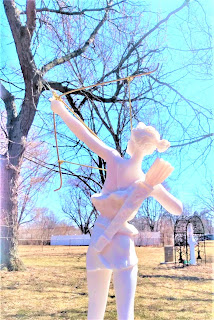Priest, Historian, Theologian, Mythologist, Author, Blogger, Philosopher, Martial Artist
Saturday, July 23, 2022
Hellenism Lost Is Honor Lost
Monday, July 11, 2022
A Hero, The Love of A God, and Hyacinth Hysteria
Thursday, May 12, 2022
Animals Do Have Religion
Wednesday, April 27, 2022
Mares of Men
Tuesday, April 19, 2022
Depression Relief Proves Divinity
Friday, April 1, 2022
Christianity Trembles Before The Pythia
Tuesday, March 22, 2022
The Cave From The Common
To look at some of the gorgeous and breathtaking caves of the world, it's not hard to see why they were sometimes used as sanctuaries of Gods. We can find ourselves feeling as though we are entering another world, leaving our own realm for an entirely new one, that even separates us from our past. In ancient Greece, I don't think this revelation changed much in the minds of worshipers, for they used these beautiful caverns to connect with the Divine world. Of course, they also built amazing temples and outdoor sanctuaries, but it appears that the Hellenic mind believed there were many ways to find the Gods. I also share that worldview. In fact, when I built my Elizabethan Sanctuary of Artemis back in 2016 when I lived in Elizabeth, Illinois, I chose to construct it within a solid, enclosed area on all sides except the entrance. It was the closest I could come to a cave-like structure on my property. It also seemed to give the precinct great protection from the elements.
On the Akropolis in Athens where Athena's grand Parthenon stood, simple cave sanctuaries could also be found on the cliffs. Zeus, Apollon and Pan all have such precincts there. But when we look deeper into the structures of caves, whether simple or elaborate, their many functions for religious purposes are revealed. You don't really have to build anything because the structure is already there by nature, the inside provides a cooling from the summer heat that would have especially been sought in a Mediterranean summer, some caves have their own water sources that might be used for purification or even drinking, and it's easy to store offerings, gifts and religious objects in safe and hidden places. There's simply just an otherworldly feeling about these majestic parts of the Earth, that by going into Gaia, we can find ourselves and our links with the universe.
I myself personally prefer a temple or built sanctuary, but all my life, I have found so much peace and wonder in the natural world. As a child and teenager, the forests of North Carolina were my running grounds. My late grandfather would even take me to the next City and its nature preserve to see Boone's Cave. I found it as mysterious, intriguing and even scary as the myths he would tell me about it. The inner workings of the Earth have become part of the human experience, religious or not. They remain as some inherent presence of our being.
In the Goodness of the Gods,
Chris Aldridge.
.jpg)




